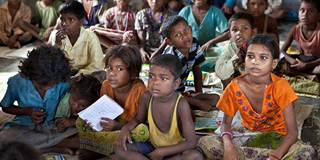With a general election approaching, India's government is planning a further extension of caste-based quotas in schools and public-sector jobs. This is typical of the two main parties' tendency to choose the path of least political resistance and defer deep reforms.
PATNA, INDIA – On January 7, Prime Minister Narendra Modi’s government suddenly announced that an additional 10% of school seats and government jobs would be set aside for the “economically weaker sections,” meaning the poor among the upper castes. This was on top of the already extensive quotas for various historically oppressed castes under India’s wide-ranging affirmative action policy. The government rushed through a constitutional amendment to this effect on January 8 and 9. The decision may well be challenged in the courts, but the announcement was an implicit confession of three failures.
The first failure is that of affirmative action. After almost seven decades, the world’s biggest and longest-running such program – mandated in India’s 1950 constitution as a temporary expedient for 15 years – has failed to ameliorate historical caste injustice. Governments have repeatedly broadened affirmative action to include larger swaths of public life, target more groups, and cover promotions as well as recruitment. Modi has been unable to fix this situation, which he inherited, but did not create.
On January 21, following Modi’s surprise announcement, Nitish Kumar, Chief Minister of the state of Bihar, called for a census of all castes in 2021 to create a system for reserving jobs based on each caste’s share of the population.

PATNA, INDIA – On January 7, Prime Minister Narendra Modi’s government suddenly announced that an additional 10% of school seats and government jobs would be set aside for the “economically weaker sections,” meaning the poor among the upper castes. This was on top of the already extensive quotas for various historically oppressed castes under India’s wide-ranging affirmative action policy. The government rushed through a constitutional amendment to this effect on January 8 and 9. The decision may well be challenged in the courts, but the announcement was an implicit confession of three failures.
The first failure is that of affirmative action. After almost seven decades, the world’s biggest and longest-running such program – mandated in India’s 1950 constitution as a temporary expedient for 15 years – has failed to ameliorate historical caste injustice. Governments have repeatedly broadened affirmative action to include larger swaths of public life, target more groups, and cover promotions as well as recruitment. Modi has been unable to fix this situation, which he inherited, but did not create.
On January 21, following Modi’s surprise announcement, Nitish Kumar, Chief Minister of the state of Bihar, called for a census of all castes in 2021 to create a system for reserving jobs based on each caste’s share of the population.